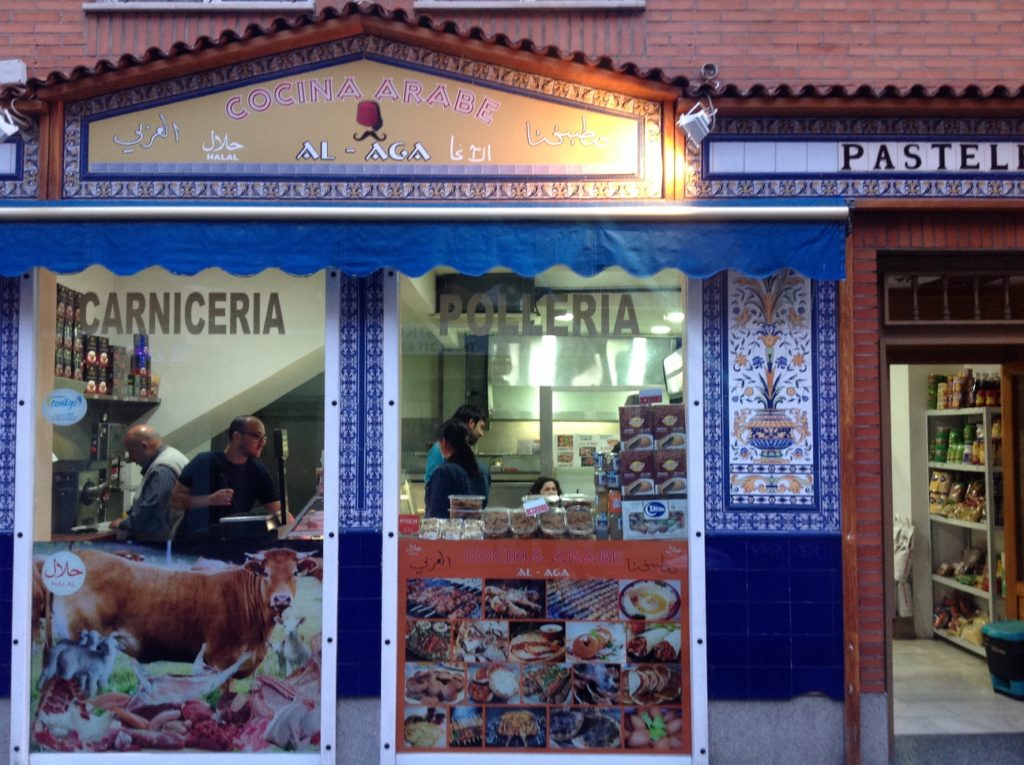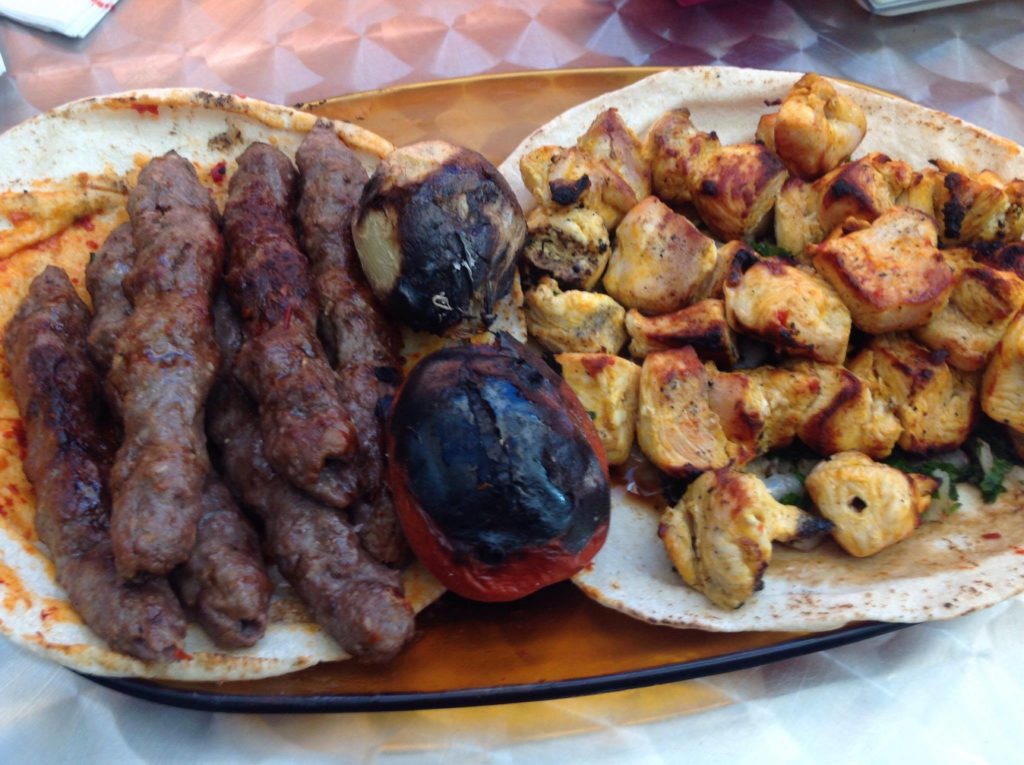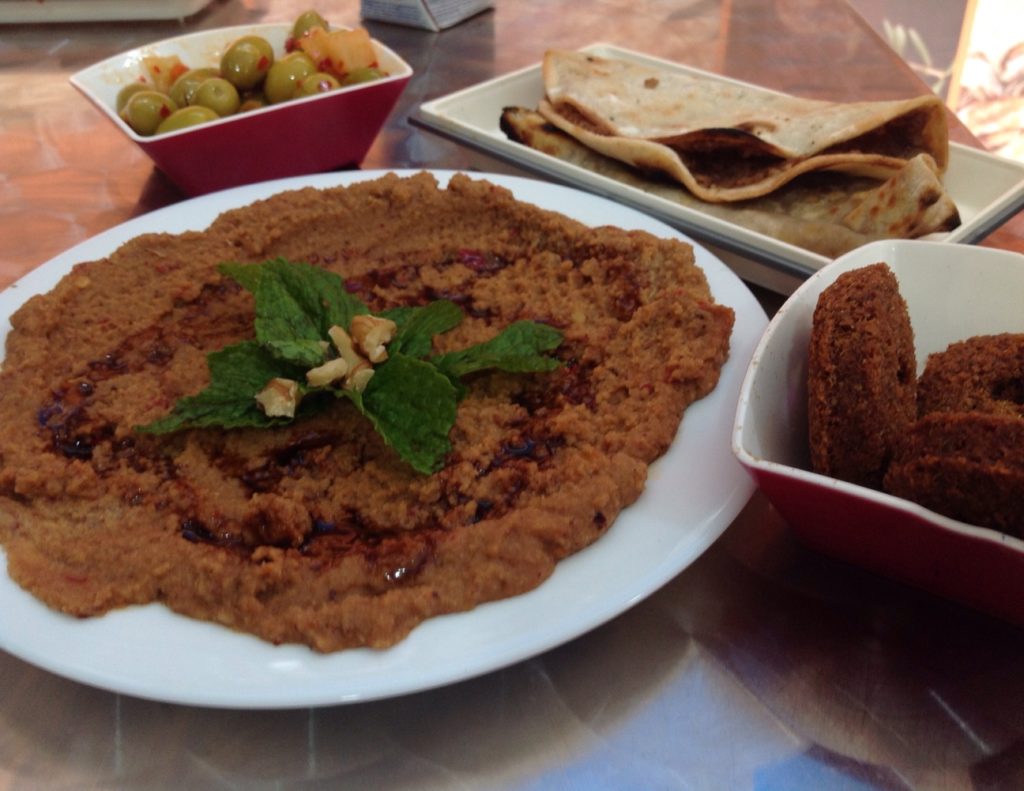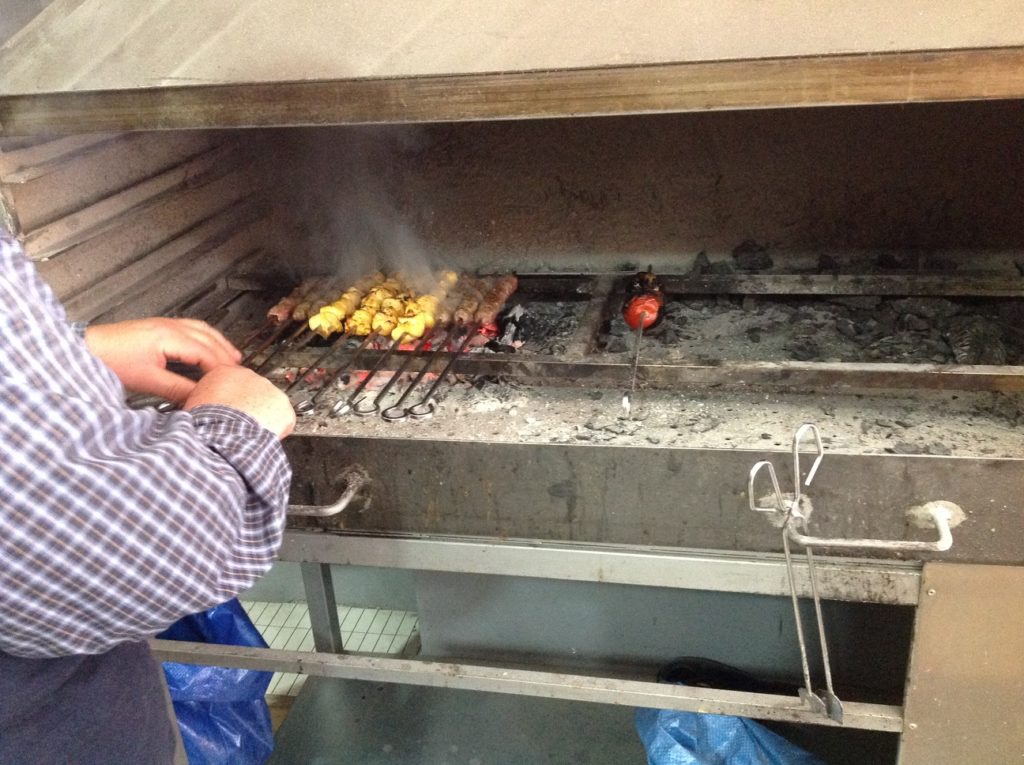By Daniel Catalan, with contributions from Nanor Demirjian, Bana Shehadeh and Fares Ak

Al-Aga, a hole-in-the-wall eatery of traditional cuisine and vendor of products used in Syrian kitchens, is owned by a 54-year old refugee. He requested to be called by his nickname, Abu-Issam, or simply as ‘a man from Syria’. As a man from Syria, he wants to represent his countrymen in a positive way in order to contradict the stereotypical ‘portrayal of Syrians as terrorists by the media’. Abu-Issam invited me, my close-friend Nanor, and interpreters Fared and Bana into his cosy establishment to sit and hear his perspective while nibbling on pickled tomatoes, sfiha flatbread, and minced meat filled toshcas drizzled with pomegranate molasses, accompanied by home-made garlic sauce and pepper paste.
Abu-Issam once had ‘a perfect life’ in the city of Homs. He was ‘happy, comfortable and established’; he had his own construction company and owned several properties. He loved his city and his life, and was a respected businessman. Construction and development were the first industries to suffer when war took hold of the region.
Abu-Issam’s home was on the border between territories held by the Syrian Opposition and Syrian Military in Homs. The conflict had been escalating and, nine months after the revolution began, there was a violent skirmish dangerously close to his home that forced his family to hide until it was safe. It was at this moment that he reluctantly resolved that they must abandon their house and all the possessions within it. First, they temporarily relocated to Damascus, before returning to an allegedly safer neighbourhood within Homs, which ultimately succumbed to the violence as well. It then became apparent that, for the safety of his wife and children, fleeing the country had become necessary. In leaving Syria he sacrificed his home and all the memories it held within, as well as his self-made business to which he had devoted 40 years of his life. Homs has since been irreparably ravaged by the conflict, with many buildings that Abu-Issam’s company built now reduced to rubble.
Originally the family had planned to establish themselves in Lebanon, but circumstances changed, rendering that option no longer feasible. Fortunately three of his brothers were long-term residents in Spain, having lived in Madrid for three decades. Ironically enough, before the onset of the war, his brothers had planned to return to Homs to retire. Abu-Issam and his wife and children applied for asylum in Spain, and this was granted to them for a five-year period.
While speaking he toyed with a masbaha, a device used to calculate his own words in order to know when to pause and pray. Abu-Issam acknowledges that as a practising Muslim it would have been far easier for him to live in Turkey, but because he does not agree with their politics he chose to relocate to Spain instead. He prefers to endure the hardships of adjusting to a Western country such as Spain, with its new language and culture, because to him this path holds more integrity and promise.
While he was wealthy in his previous life in Syria, moving to Madrid left Abu-Issam bankrupt and in debt. Opening his business was frustrating as he was not aware of the intricacies of Spanish bureaucracy. He hired a team of local experts to help him navigate the required paperwork and, in hindsight, views this as one of his more costly mistakes. His health suffered from the stress brought on by poor council, and from being on his feet during the long days at work. Lacking resources, he’s been unable to hire employees to assist him, which has taken its physical toll; he showed us his legs, inflamed and discoloured. Despite this, he perseveres and works round-the-clock in a stifling kitchen to make a living, so that he can put his children on ‘the beginning of their way’.

Back in Syria he would often host his friends and family for lavish feasts in his home; these fond memories were the motivating factor in his decision to open an eatery upon arrival in Spain. ‘Syrian food has heritage,’ he said with a smile. ‘It’s a mix of Turkish, Armenian, Lebanese and Palestinian cuisine.’ He lit up with excitement when the interpreters relayed to him that this meal was my first experience of Syrian dining. While we were conversing, several customers came into his shop to purchase products and he was quick to point out how well received his business has been by neighbours: ‘[We] Syrians are kind people who add love to the food that we make. You cannot feel the same love at restaurants outside of Syria.’ My friend Nanor shared this sentiment and nodded enthusiastically in agreement.

I noticed that his clients included both local and immigrant families. The love Abu-Issam described is most apparent when watching his hands mould the dough used to make the sifha flatbreads, or crushing Aleppo pepper to make his home-made paste. He uses a blow-drier to nurture the flames of the charcoal grill with precision before inserting skewers of kebab, chicken, tomatoes and onions, which he manages attentively until they are cooked to perfection. He then places the kebab on a fresh pita bread covered in a layer of his homemade pepper paste, and puts the chicken on a pita layered with chopped onions and parsley. The cosy establishment slowly fills with the enticing smells of charcoal and grilled meat.

Like many Syrians, Abu-Issam is concerned for the lives of other refugees, many of whom are struggling to find a place that will accept them. He fears that the media is influencing people to view Syrians as hostile and to see violence in Syria as a natural—and thus acceptable—occurrence. ‘That is not true and it is not how Syrians are,’ he said. And ‘When will it end?’ he asked me with a saddened expression. He wanted to know how much worse the situation needs to be for members of the international community to protest in the streets and call for their respective governments to act. The emotion drained him and he retreated to the kitchen to prepare for closing.
Abu-Issam’s son and nephew, who were also present, remained in the room and shared a younger generation’s perspective with us. His nephew was born in Spain and identifies himself as Spanish while being trilingual in Spanish, Arabic and English. His parents insisted that he speak to them in Arabic at home and enrolled him in Arabic classes at his local mosque on Saturdays for most of his childhood. Abu-Issam’s son, Issam, said that Spaniards have been very kind to him and that he has never experienced outright racism or hostility. He does not drink alcohol and feels that his abstinence can be a great barrier socially, but despite this, he still has fun with his friends who have been both welcoming and inclusive. Proceeding with his studies in Spanish has proven difficult, yet, like his father, he perseveres. He goes to the gym every day and he rides horses at a stable in the outskirts of Madrid once a week.
Anyone who pays a visit to Al-Aga to sample items from their menu receives a window into the world of authentic Syrian cuisine and will want to return. Several days after the interview, Nanor and I went back to his establishment for a second time and we were warmly greeted by Abu-Issam. His business is yet to turn a profit, but one could foresee that changing as word of Abu-Issam’s work spreads. Keep in mind that as it stands, this eatery only has two tables and the food is intended to be taken to go.
As an American-born Syrian-Armenian with family based in Syria, as well as having family scattered all over the world, Nanor often seeks out Syrian cuisine as comfort food, which evokes her heritage and memories of family reunions. She recalls fondly how, whenever members of her family would visit her in San Francisco, they would bring Aleppo pepper, nutmeg, sumakh, baharat, zaatar and other spices in bulk. These ingredients would be meticulously packed away between their clothes, resulting in her visitors smelling like these items. She observed the great lengths that her family would go to replicate their Syrian kitchens, and now sees comforting parallels in Abu-Issam’s establishment.
Nanor felt fortunate to find Al-Aga, not only because of its familiarity, but also because she has since been able to shed light on the people who are running it and let their story be heard. She commented: ‘It’s easy to watch the news and hear about the destruction, but it’s not as easy to connect to on a human level. Syria welcomed my great-grandparents, survivors of the Armenian genocide, and gave them and other survivors a safe environment to grow a flourishing community. Now that war is destroying Syria, I urge the world to pay attention and support the refugees however they may need.’
Al-Aga
Calle Villaamil, 52
28039 Madrid, Spain
+34 910 703 115
About the author: Daniel Catalan is a contributing writer to Naked Madrid, a food, culture and lifestyle blog oriented towards Madrid’s international community. His ambition is to grant his readers access to the wealth of stories and stones unturned within his adopted city.
[Photography: Daniel Catalan]

